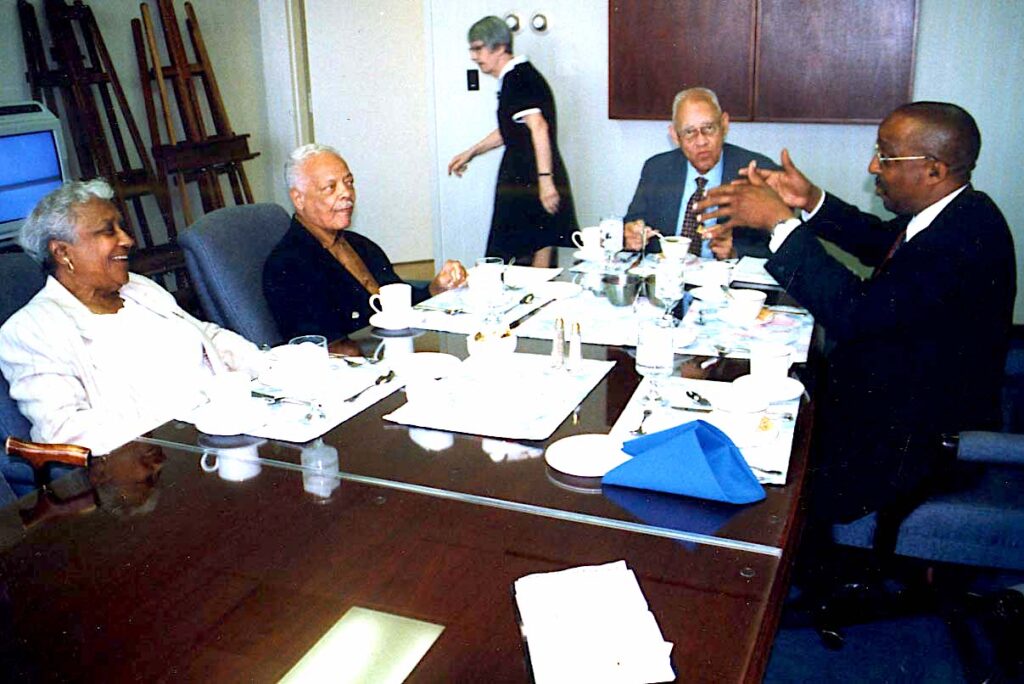By Dwight Bachman, Public Information Officer, Eastern Connecticut State University
“Simply put, Art Johnson was a brilliant, renaissance man.” That is how legendary radio/television news reporter Lew Brown described the late Arthur Johnson, who was an exemplary orator, author, educator, Tuskegee Airman, journalist and civil rights icon. Johnson was 81 when he died on Sept. 6, 1999.
As a lifetime member of the national NAACP, Johnson fought for voting rights and an end to desegregation throughout the ‘’40s, ‘50s and ‘60s. He marched in the famous “March on Washington in 1963, where Dr. Martin Luther King Jr. gave his famous “I Have a Dream” speech.
Locally, Johnson served as president of the Hartford NAACP, executive director of Hartford’s Human Relations Commission and attended UConn Law School. He was the president of WKND-AM Radio, host of a public affairs show on WFSB-TV, a columnist for the “Hartford Inquirer” and author of poetry for more than 60 years.
His niece Diane Eubank wrote in Johnson’s “Book of Collected Poetry” that Johnson, affectionately known as ‘Shrimp’, was “the conscience of the community.” Readers were smitten by his poetry. His poem “Style,” to his wife Marie Love, was one of his most popular:
“Style in everything you do.
Style in just being you.
Style in the way you fix your hair.
Style in the way you climb a stair.
Style in movements light and free.
Style in the smile you give to me.
Style in everything; all the while,
Honey Chile, you’re just my style.”
Eubank noted that Johnson also “was an accomplished boxer, basketball player and track star at Weaver High School in Hartford, where he established a long jump record that stood for 35 years.”
Johnson joined the faculty at Eastern Connecticut State University in 1969 as an assistant professor of sociology. Students loved him.
“My sophomore year, I took ‘Social Problems’ with Art,” said Laura Tordenti. “It was one of the best classes I had at Eastern. Art was very knowledgeable and passionate about his field and had tremendous real life experiences, such that he was able to create a dynamic learning environment that truly engaged the class as we discussed weighty issues such as inequality, racism, poverty, crime, and alcohol and substance use disorders.”
Tordenti said the first week, Art took the class on a walking tour of downtown Willimantic to get a sense of the very real challenges faced by many who were struggling to live in a small city in the Northeast. “The last day of class that semester, he took all of us down to IGs, the old Italian Garden on Main Street, and treated us to pizza. When I returned to Eastern in 2000 as vice president for student affairs, it was only fitting that 22 years later, that we dedicated the Unity Center in his honor.”
When Dr. David G. Carter became Eastern president in 1988, he asked Johnson to serve as his special assistant. Carter appreciated Johnson’s marketing vision and relationships in the larger community.
“Art raised the consciousness of government leaders, corporate executives, educators and social services workers across the state. His courage, fortitude, determination and high standard helped shaped public policy that changed the course of history in Connecticut. Art led an exemplary life of giving back. What I really love about him is that not once did he sacrifice his integrity.”
Carter noted Johnson’s “proficiency and ease in the English language were a cause to marvel.” He asked Johnson to write a poem to celebrate the dedication of the Foster Clock Tower. Johnson ended the poem, describing Eastern as “The Jewel of the East.” Then CSU Chancellor William Cibes Jr. described the phrase as “a brilliant marketing phrase for a fast-growing university.”
As special assistant, Johnson organized all of Carter’s annual staff “retreats,” which he described as “advances.” Johnson said, “a university should perceive itself as advancing, not retreating. You cannot make progress looking back. To make progress, one must look forward.”
Johnson was well-known for reaching into his pocket to help students in need of money for books, food, even rent. “He was a very giving person,” Dr. Marie Love, Johnson’s late wife, told reporters in November 2000. Marie Love, family and friends established the Dr. Arthur L. Johnson Unity Endowed Fund to provide emergency financial help to students.
A month earlier, Eastern named its Unity Center on High Street the Dr. Arthur L. Johnson Unity Center. More than 200 people, many from Hartford, gathered for the celebration. The center, which opened in 1997, was a gathering place for a wide range of diverse student groups.
When the Student Center on campus was renovated in 2008, the Unity Center moved to the lower level of the renovated Student Center as the Arthur Lyman Wing of the Student Center.
Carter said, “We all will miss Art’s wisdom and counsel. His greatness of mind and heart helped all of us, and his commitment to the betterment of humanity will be with us forever.”
Johnson earned his baccalaureate and master’s degree from Johnson C. Smith University, which also presented him an Honorary Doctorate.


